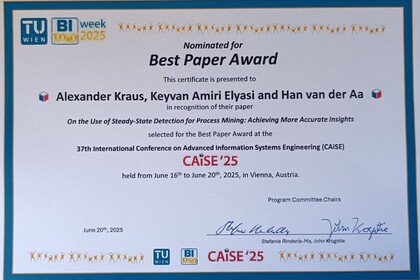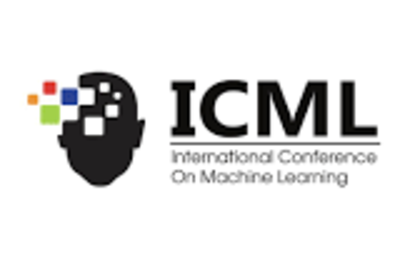Research
The central challenge of nowadays information society is to take advantage of the deluge of information that is available on the Web as well as in enterprise contexts.
In order to support companies, public institutions, and individuals to facilitate the available information for their needs, the Data and Web ScienceGroup conducts research on methods for managing, integrating, and mining large-amounts of heterogeneous information within enterprise and open Web contexts.
Our research is focused on the following areas:
- Web-based Systems (Prof. Dr. Bizer)
- Data Analytics (Prof. Dr. Gemulla)
- Web Data Mining (Prof. Dr. Paulheim)
- Natural Language Processing (Prof. Dr. Ponzetto)
- Artificial Intelligence (Prof. Dr. Stuckenschmidt)
- Process Analytics (Prof. Dr. Van der Aa)
- Responsible AI and Digital Health (Jun.-Prof. Dr. Philipp Kellmeyer)
- Computer Vision & Machine Learning (Prof. Dr.-Ing. Keuper)
Web-based Systems (Prof. Bizer)
The focus area Web-based Systems explores technical and empirical questions concerning the development of global, decentralized information environments. Our current focus is the evolution of the World Wide Web from a medium for the publication of documents into a global dataspace. Our empirical work is accompanying this evolution by monitoring the adoption of Semantic Markup and Linked Data technologies on the Web. Our technical work focuses on integrating data from large numbers of Web data sources and includes topics such as information extraction, identity resolution, schema matching, data fusion, and data search. We apply the developed methods for the tasks of integrating product data from large numbers of e-shops as well as for creating large-scale knowledge bases such as DBpedia. More information ...
Data Analytics (Prof. Gemulla)
Our group's research focuses on systems and methods for analyzing and and learning from large datasets as well as their application in practice, including:
- Machine learning with semi-structured/structured datadata
- Combining unstructured and structured knowledge
- Representation learning for multi-relational graphs
- Efficient and scalable methods and systems for data-intensive processing
Web Data Mining (Prof. Paulheim)
The group carries out research on methods for mining knowledge from large amounts of structured and unstructured data on the Web. In order to address the challenges of Web-scale data mining in terms of the size, heterogeneity, and dynamics of the data, a focus is on supervised or unsupervised methods that combine logical and statistical inference. Existing and automatically acquired knowledge is used to facilitate data integration, enrichment, and cleansing, as well as to bootstrap the overall data mining process. More information ...
Natural Language Processing (Prof. Ponzetto)
The NLP and IR group at DWS conducts research on methods for knowledge acquisition and natural language processing (NLP), as well as their application to support empirical research in (Computational) Social Sciences and (Digital) Humanities. In our work, we investigate a wide range of techniques for text understanding – ranging from representation learning and distributional semantics all the way through symbolic, entity-based approaches leveraging wide-coverage knowledge graphs – and apply these to a wide range of research topics such as such computational semantics, multilinguality, information retrieval and multimodal NLP, to name a few. More information ...
Artificial Intelligence (Prof. Stuckenschmidt)
We are an internationally visible research group in Artificial Intelligence with currently approx, 25 researchers and PhD Students. We develop and improve AI methods in the following areas:
- Machine Learning from Structured Data
- Neuro-Symbolic Reasoning and Learning
- Fairness and Explainable Artificial Intelligence
We are also interested in real-world applications of Artificial Intelligence and cooperate with Companies and Researchers from other disciplines to provide state-of-the-art to real problems, including the following applications.
- Business Process Analysis and Optimization
- Data-Driven Demand Forecasting and Supply-Chain Management
- Human Activity and Goal Recognition
- Smart Cities, Smart Mobility and Smart Logistics
We closely cooperate with the AI Systems Engineering Group at the Institute for Enterprise Systems and have ongoing cooperations with regional organizations like SAP and the City of Mannheim.
Process Analytics (Prof. Van der Aa)
The Process Analytics group at DWS conducts research on the interplay of business processes and information systems, in which we particularly focus the development of automated methods for data-driven process analysis. This focus encompasses research areas such as process analysis, process mining, and robotic process automation. Our primary interests in these areas include, but are not limited to, conformance checking, natural language processing, event abstraction, data privacy, and data uncertainty.
Responsible AI & Digital Health (Jun.-Prof. Dr. Kellmeyer)
The responsible development of AI systems has become an important objective against the background of the accelerating innovation dynamics of AI and related digital technologies. For effective and adaptive regulation, normative, technical and societal requirements and interests need to be balanced. In his highly inter- and transdisciplinary multi-level research program, Jun.-Prof. Dr. Kellmeyer combines research on conceptual foundations with empirical mixed-methods research on human-technology interaction with a specific focus on AI systems in digital health.
Computer Vision & Machine Learning (Prof. Keuper)
Our research interests are in Computer Vision and Machine Learning, with applications in a wide varietey of fields, such as
- Improving Model Robustness and Generalization Ability
- Neural Architecture Search
- Grouping Problems (in applications such as Image and Motion Segmentation and Multiple Object Tracking)
- Efficient Solvers for Large Grouping Problems
- Motion Estimation and Motion Segmentation
- Image Analysis
- Image Generation and Deep Fake Detection




